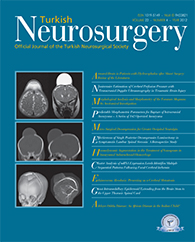2Acibadem Maslak Hospital, Department of Neurosurgery, Istanbul, Turkey
3M.H. Istanbul Medeniyet University, Goztepe Education and Research Hospital, Department of Neurosurgery, Istanbul, Turkey DOI : 10.5137/1019-5149.JTN.4201-11.1 AIM: In traumatic brain injury (TBI) patients, to overcome the secondary insults, cerebral perfusion pressure (CPP) oriented therapy is recommended. The study is assigned to estimate CPP values with middle cerebral artery (MCA) flow velocities measured noninvasively using transcranial Doppler ultrasonography (TCD).
MATERIAL and METHODS: Forty-seven TBI patients were studied. Intracranial pressure (ICP), mean arterial pressure (MAP) and MCA flow velocities of the patients were monitored. Invasive CPP was calculated as the difference between MAP and ICP. The formula : ‘MAP x FVd/FVm +14' was used to estimate CPP noninvasively. Correlation of the noninvasive and invasive values were analysed.
RESULTS: The mean values of noninvasive CPP and invasive CPP were 66.10 ± 10.55 mmHg and 65.40 ± 10.03 mmHg respectively. The correlation between noninvasive and invasive CPP measurements was strongly significant (p < 0.001) with a correlation coefficient of r = 0.920.
CONCLUSION: With ICP monitoring systems, CPP is calculated and the therapy is guided according to these values. As it is recognized that brain perfusion can be assessed with TCD waveforms, noninvasive CPP estimation with MCA flow velocities may help to observe the trends in CPP values.
Keywords : Cerebral perfusion pressure, Estimated cerebral perfusion pressure, Transcranial doppler ultrasonography, Traumatic brain injury




